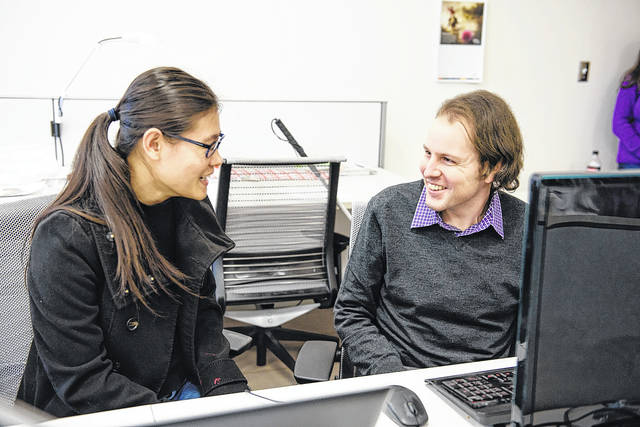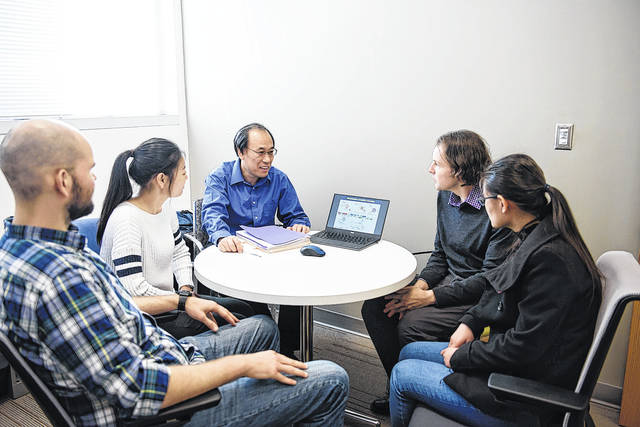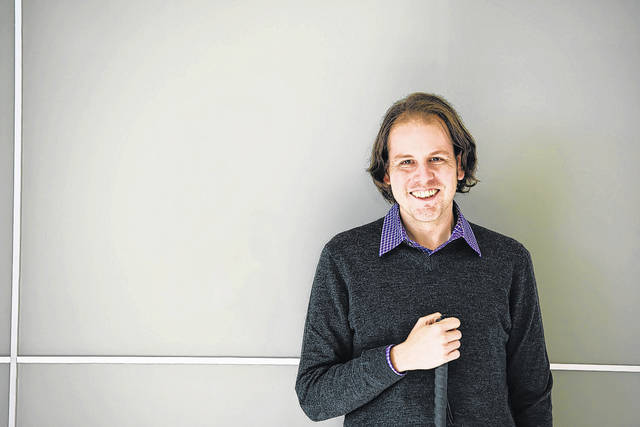PICKENS COUNTY – Recent Clemson graduate Jose Guevara refused to allow a loss of vision to impede his dream of becoming a scientist.
Through hard work and perseverance in his last semester of graduate school, Guevara received the first Susan R. Patterson Professional Development Award in Bioinformatics and Computational Genomics from the Greenwood Genetic Center (GGC) for his work in the field.
Much of Guevara’s doctoral work in genetics and biochemistry focused on developing bioinformatic and computational methods to study intellectual disabilities at the molecular level. The study was completed, in part, after he lost his sight in 2014.
“My condition appears to be idiopathic. It’s the result of intracranial hypertension, which is basically increased pressure in the cranial cavity in the brain,” Guevara explained. “Easier put, it was a swollen brain, and it compressed my optic nerve.”
Guevara was halfway through his doctoral program when he began having headaches. Those headaches gave way to blurry vision, and eventually, Jose was flown home to Costa Rica for medical treatment.
“The headaches weren’t caught in time,” Guevara said. “I kept seeing less and less until I became completely blind. I spent almost a year in the intensive care unit in Costa Rica, where I underwent a series of brain surgeries.”
Where most people would have succumbed to the circumstances, Jose found an opportunity to excel.
“When I was in the ICU, I kept getting sicker, and everything was just going downhill. At that point, I was completely blind, and a doctor came in. I asked him: ‘Will I ever see again?’ He said, ‘No. Don’t get your hopes up,’ ” Guevara said. “The first thing that came to mind was that I will not be broken. I said to myself, ‘This is not how it ends. Even if I have to claw my way out of this, I will work my way out. I don’t know how, but I am finishing my Ph.D.’ ”
That’s precisely what Guevara did. He returned to Clemson in the fall of 2015 and picked up where he had left off, just with a few modifications. To study bioinformatics, a primarily computer-based science, Guevara began using a large computer monitor set on high-contrast mode. This blackens the display and turns the font into neon colors, making it easier for Guevara to see what is on the screen.
In his research, Guevara uses statistical and computational analyses to link groups of amino acids and their mutations with a set of observable characteristics – called a phenotype – found in a specific protein family associated with Snyder-Robinson syndrome.
He also has delved into machine learning – a field of computer science that allows computers to teach themselves through a series of prediction-based algorithms – to study the effect that amino acid substitutions have on protein stability.
“A lot of diseases are caused by amino acid substitutions, a significant number of which lead to protein destabilization,” Guevara said. “It’s a field that, although previously studied, we thought was important to revisit with the use of sequence-based features. This allowed us to determine the influence of specific amino acid substitutions on disease.”
Guevara – who conducted much of his graduate work under adjunct professor Charles Schwartz from GGC – also exploited machine learning to identify candidate genes involved in intellectual disability.
“Intellectual disabilities are remarkably complex disorders, and our understanding of them has significantly changed as my Ph.D. work has progressed,” Guevara said. “Using new methods in bioinformatics, we have uncovered what was previously defined as junk DNA – DNA with no purpose – actually has a significant role and possible involvement in the causes of intellectual disabilities.”
Guevara said that he was honored to receive GGC’s Susan Patterson Award, which came as a total surprise to him.
“It was completely unexpected; I didn’t even know about the award,” Guevara said. “You don’t want to be singled out as the person who receives things due to a visual impairment; you want to be recognized for the quality of your work. So, I was honored to receive the award because it shows that the quality of my work was deemed worthy, all things aside. It was very gratifying.”
The award was created by Walt Patterson, professor emeritus of mathematics at Lander University, to honor his late wife, Susan, who was passionate about both teaching mathematics and supporting families confronted with genetic disorders at GGC. The center intends for the award to support the professional development of faculty and staff at GGC.
Guevara used funds from the award to travel to Las Vegas last summer for the BIOCOMP’17 Conference on Bioinformatics and Computational Biology, where he presented research he conducted with Schwartz and his doctoral adviser, professor L.J. Wang.
Although his visual impairment was an added challenge, Guevara graduated in December with a Ph.D. in genetics that he will use to fulfill his lifelong dream.
“When I was being interviewed to join Clemson, they asked me what I wanted to do with my degree, and I said, ‘academia.’ That has been, and will always be, my dream – to be a professor,” Guevara said. “Although you can do significant work in industry, the research that really makes the difference, that really sets science in motion, is done in academia. As a professor, you become part of a larger, sharing community. You provide knowledge to the world, and that’s what I want to do.”
In January, Guevara began a professorship at the University of Costa Rica, where he is teaching bioinformatics and continuing his research.
“We all are capable of overcoming trials and tribulations in life, and it’s the tribulations that leave us marked. What we do afterwards is what makes the difference,” Guevara said. “I want to show individuals that it doesn’t matter what you’re going through – there’s always a way out of it. You can always make it through. You don’t have to give up.”



